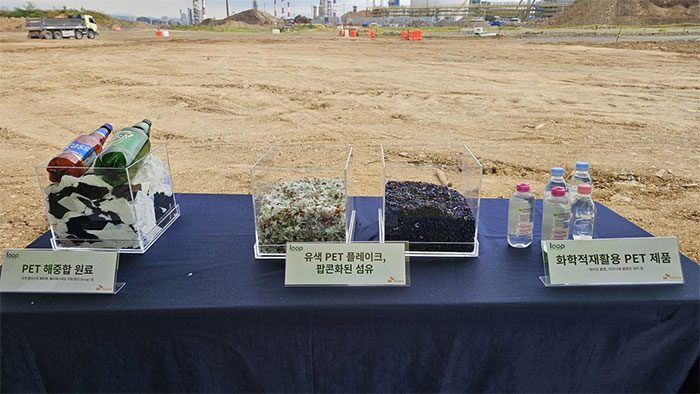The most common recycling process for plastics involves cutting used plastic into small pieces, washing, sorting, and drying, then transforming what remains into new plastic. However, South Korea is constructing advanced recycling facilities that do not compromise the quality of plastic.
A more complex method known as chemical recycling involves extracting raw materials from used plastics or significantly altering the chemical structure of waste. Therefore, chemical recycling does not require sorting plastic waste by color or contamination status.

The image released by SK shows the stages of transforming PET plastic waste and clothing into plastic pieces and ultimately recycling them into new plastic bottles. (Photo: Yonhap)
SK Group of South Korea is leading in chemical recycling. The Yonhap News Agency reports that SK is building the world’s first plastic recycling complex with core chemical recycling facilities.
The Advanced Recycling Cluster (ARC) will be constructed on a site measuring 215,000 square meters—equivalent to 22 football fields. This 1.8 trillion won (1.35 billion USD) project is set to break ground next October, aiming to begin operations by 2025. A representative from SK stated that approximately 320,000 tons of plastic waste—equivalent to 213 million 500ml PET bottles—will be recycled annually once the ARC is operational.
The ARC will have three main chemical recycling facilities: high-purity polypropylene (PP) extraction, PET or polyester depolymerization, and pyrolysis. The depolymerization process transforms plastic waste into its original monomer form, facilitating recycling without compromising quality.
SK has a licensing agreement with Plastic Energy, a UK-based recycling company, for pyrolysis— a technology that converts plastic waste into crude oil through high-temperature heating with limited oxygen. Plastic products, such as baby bottles and automotive interior materials, are typically made from crude oil.
Engineer Park Ji-hoon at SK stated, since this is chemical recycling, it has the advantage of producing recycled PET in an almost pure form. He noted that these chemical recycling processes will ultimately help create a “circular economy” that transforms waste into resources and addresses landfill issues as well as other waste management methods.
A ban on landfilling municipal waste in South Korea will take effect in 2030, requiring all residential waste to be recycled or incinerated.
SK Group Chairman Chey Tae-won previously stated that SK aims to reduce carbon emissions by 200 million tons, which is equivalent to 1% of the global target set by the International Energy Agency (IEA).


















































